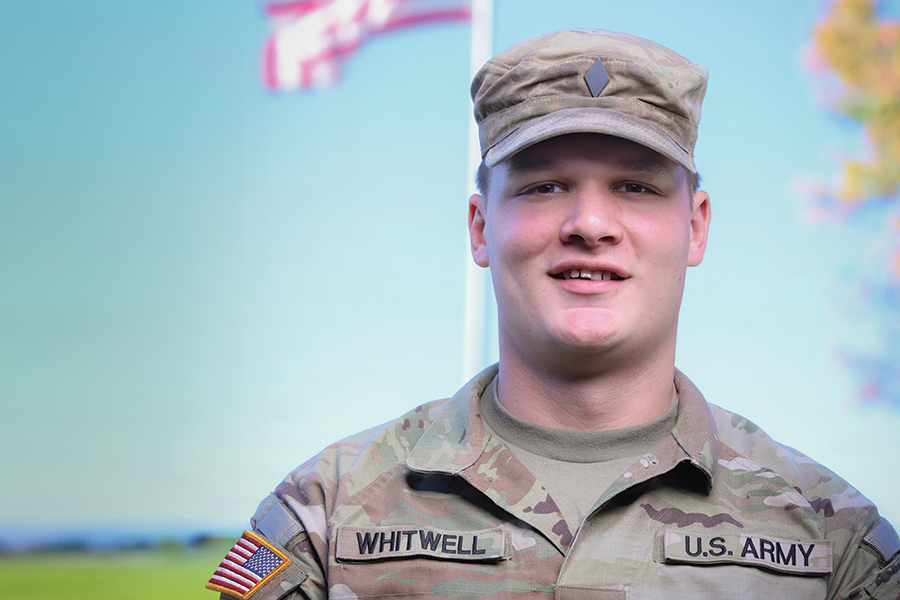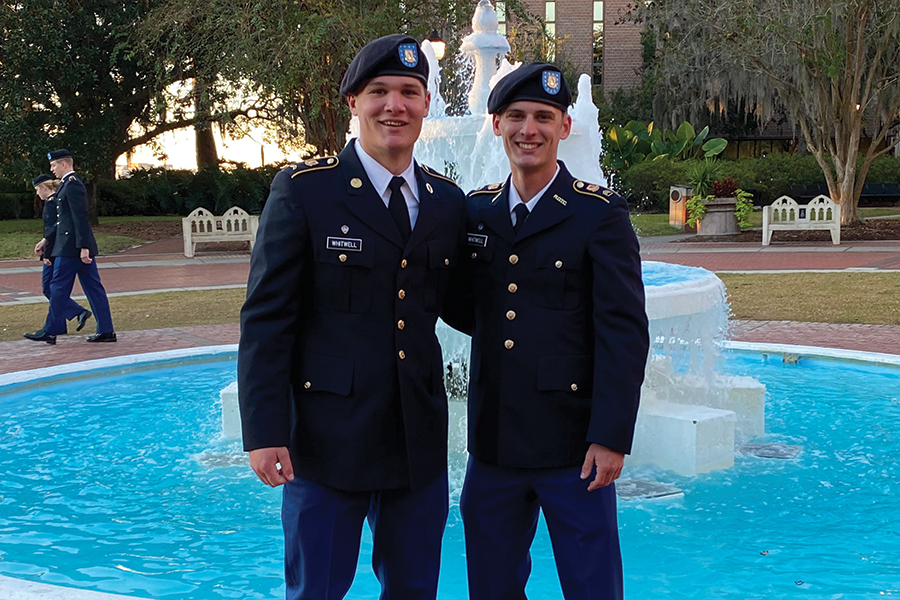Army Strong

Deep in the woods, hours past midnight, Luke Whitwell’s day is finally coming to a close.
Whitwell had just completed Army Reserve Officer Training Corps land navigation training with his fellow cadets at the park surrounding the Pat Thomas Law Enforcement Academy in Tallahassee. His 30,000-step day began with ROTC physical training at 6 a.m. followed by a “theory of numbers” midterm, for which he stayed up late studying, a full day of classes, and finally, eight hours of land nav.
For the Florida State University Army ROTC cadet and senior pure mathematics major, this lifestyle is one he expected. With two Sailors in the family — his father served for 23 years and his mother for 12 — Whitwell always knew he wanted to serve.
“My dad loved what he did in the Navy, and it brought him and my mother great job satisfaction,” he said. “That opened my eyes to opportunities the military could give me in the future; I want to serve and give back to the country that has given us everything.”
Whitwell wasn’t clear on the details of how he’d serve until he found further inspiration at home. His brother, Kenneth, led the way as an FSU Army ROTC cadet, graduating in Spring 2023 with a bachelor’s in psychology. The brothers, who are a year apart, both joined ROTC during their respective freshman years, which allowed Kenneth the opportunity to show his brother the ropes.
“He is my best friend, and we even roomed together for a year at FSU,” Whitwell said. “Growing up, we always knew we wanted to serve, so this was a logical step in our college experience.”

After initially entering FSU on the pre-med track, Whitwell later opted for a major in the Department of Mathematics. Pure mathematics is largely reliant on theoretical concepts, studying and answering mathematic questions without practical intrusions from fields like engineering or physics. The field of number theory, which Whitwell favors, examines numbers themselves and how all possible numbers might interact with one another.
“Numbers always made sense to me,” he said. “I love math more as I progress through the program, and it has become a passion rather than just classwork.”
Many pure mathematicians often become professors and researchers, while others pursue careers as actuaries, business analysts, and even computer scientists. In the military, mathematicians have had storied careers as cryptographers, creating and breaking codes to protect U.S. servicemembers and operations. Math is also used by Explosive Ordinance Disposal teams in disarming and neutralizing threats from unexploded rounds or explosive devices.
Keen logic, such as is developed through a mathematics education, also equips an officer to meet the daily challenges and multi-layered problems one encounters as a professional Soldier.
“In math, problem-solving is a hard skill, but in the Army, it is a critical soft skill,” Whitwell said. “I plan to leverage my math experience by taking advantage of this transferrable skill.”
Whitwell’s primary training and development as a future officer, however, has been enhanced through a series of leadership roles featuring varied levels of responsibility.
As executive officer, the Seminole Battalion’s second in command, Whitwell directs staff officers under the battalion commander’s guidance. Similar to the role of a chief of staff, he trains juniors in basic ROTC skills and collaborates with fellow seniors to plan training activities.
As an extension of the role, Whitwell attended summer training at Fort Knox in Kentucky where he and other rising senior cadets were tested on comprehensive ROTC knowledge, culminating in a 12-day field exercise cadets must pass in order to commission.
“Cadet Whitwell earned one of the highest scores at summer training,” said Army Lt. Col. Travis Owen, department chair and professor of military science. “Faculty and staff already recognized his talent, and his summer training performance further confirmed making him executive officer was the right decision.”
After graduating and commissioning as a second lieutenant this spring, Whitwell plans to become an EOD specialist at Eglin Air Force Base, near his hometown of Perdido Key, Florida.
EOD is the only group open to members from all branches of service. With family background of Navy members, nearly four years of Army training, and plans to complete EOD training at an Air Force base, Whitwell epitomizes a joint-force mindset.
“Cadet Whitwell displays the character and drive of a successful future Army officer,” Owen said. “He has interpersonal tact, values, and humility, which are indicative of a servant leader. I have no doubt he will lead our warfighters into the future.”
